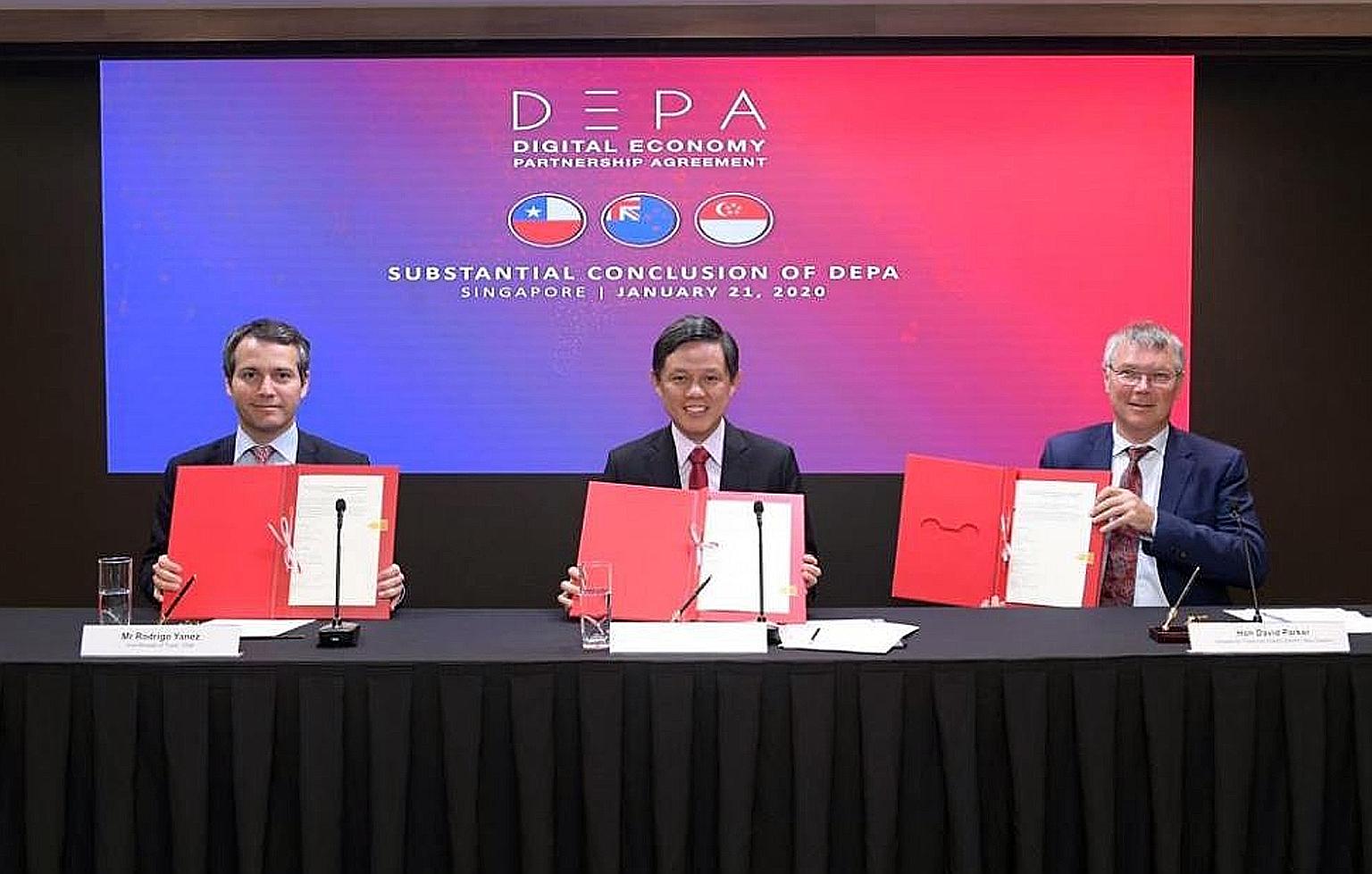Singapore, New Zealand and Chile conclude talks on digital trade pact
Sign up now: Get ST's newsletters delivered to your inbox

From left: Chile's Vice-Minister for Trade Rodrigo Yanez; Trade and Industry Minister Chan Chun Sing; and New Zealand's Minister for Trade and Export Growth David Parker after signing a joint statement on the substantial conclusion of talks on the Digital Economy Partnership Agreement yesterday.
PHOTO: MTI
Ovais Subhani Senior Correspondent, Ovais Subhani
Follow topic:
Singapore, New Zealand and Chile have concluded talks on an agreement over a common set of rules, standards and guidelines for global digital trade and commerce.
The three countries jointly announced in Singapore yesterday the substantial conclusion of the negotiations for the Digital Economy Partnership Agreement (DEPA).
Minister for Trade and Industry Chan Chun Sing said the three countries are targeting to finalise and sign the agreement during the next Asia-Pacific Economic Cooperation (Apec) meeting in April.
The agreement represents a building block towards fostering greater digital connectivity between countries and developing multilateral rules on digital trade at the World Trade Organisation (WTO).
Mr Chan, at the signing ceremony, said: "As the nature of commerce and trade evolves due to digitalisation, it is important that we build new forms of cross-border linkages in order to create opportunities for our businesses to thrive in the digital economy."
The ceremony to sign a joint statement was attended by New Zealand's Minister for Trade and Export Growth David Parker and Chile's Vice-Minister for Trade Rodrigo Yanez.
In addition to establishing rules for digital trade, the DEPA fosters cooperation in emerging digital areas, according to a statement jointly issued by the Ministry of Trade and Industry, Ministry of Communications and Information, and Infocomm Media Development Authority.
The agreement also addresses new issues brought about by digitalisation, including e-invoicing, digital identities, financial technology or fintech, artificial intelligence, data flows and data innovation, trade and investment opportunities for small and medium-sized enterprises, and digital inclusivity, the statement said.
The deal will complement Singapore's network of free trade agreements and its efforts as co-convener of the WTO Joint Statement Initiative on E-Commerce to develop baseline digital trade rules, said Mr Chan.
"Singapore, Chile and New Zealand enjoy longstanding and warm relations. The substantial conclusion of DEPA negotiations demonstrates our robust partnership and will increase digital connectivity and strengthen economic ties between our countries."
The joint ministerial statement said the three countries recognise that digitalisation has transformed the nature of trade, and that small, outward-facing and trade-dependent countries like them share a common objective of advancing trade in the digital era.
"We also recognise that current trade rules and policies do not fully address the new issues brought about by digitalisation and digital trade," it said.
Mr Chan said through the DEPA, the three nations are seeking to achieve three main objectives.
First, to go beyond the current disciplines in their existing free trade agreements. Second, to improve business connectivity, and third, to address new issues intrinsic to the digital realm.
With rapid technological changes and digitalisation of business and financial processes spreading at an incredible pace, governments are waking up to the need for new rules and standards for the digital era.
While cross-border e-commerce is booming, businesses still need to navigate challenges from delivery logistics to secure payments.
Data localisation policies are also threatening to fragment the global digital economy.
The recently concluded United States-Mexico-Canada Agreement (USMCA), the updated North American Free Trade Agreement, was one of the first free trade agreements to have a digital economy focus.
Last year's EU-Japan Economic Partnership Agreement also includes some wide-ranging commitments on digital trade.
WTO's progress on the Joint Statement Initiative is probably the most significant pan-national work on digital commerce.
Singapore is also negotiating a similar agreement with Australia. Talks on the Singapore-Australia Digital Economy Agreement started last October.
The Going Digital initiative by the Organisation for Economic Cooperation and Development is also aimed at building a coherent and comprehensive policy approach to digital transformation.

